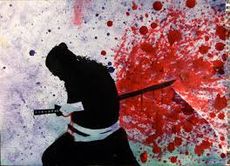Part 1: In Hiroshima I think the character that has seemed the most interesting is Mrs. Nakamura. I like the fact that in spite of losing her husband she became a woman who would do anything for children. She's strong and willing and won't let anything stop her from being there for them as a mother and a care taker. Not even the nuclear bomb that was just dropped near their home would stop her. She literally dug out her children with her bare hands and made sure they were okay. The strength it takes for someone to think of others before yourself is immensely admirable. I think that her response has shown that she a mother at instinct and a selfless woman. On page 19 it says "[Mrs. Nakamura] worried rather confusedly about [her children] being cold. so she went back into the wreckage and burrowed underneath and found a bundle of clothes she had packed for an emergency, and she dressed them in pants, blouses, shoes, padded-cotton air-raid helmets called bokuzuki and even, irrationally, over coats."
Part 2: The research question I chose is; "Why is it considered honorable to commit suicide?" Not to bring this up again but I did live in Japan. One month prior to moving there a man had been murdered in Shibuya, I believe. Although his murder was accidental, I believe, he walked out in front of a car drunk and was hit. His family was so devastated about what had happened, leaving the culprit with guilt. About three days or so had passed and he stepped off a train platform, and was hit by an oncoming train, ending his own life. He "fell on his own sword." Culturally suicide means admitting defeat or disgrace and atonning for ones own sins or wrong doings. It's kind of like the bigger man paradigm, is that the right term? I don't know. Being the bigger man and taking blame or acknowledging what has been done, with no adjectives, exagerations, and embelishments.
Attached is the link.
https://www.psychologytoday.com/blog/minority-report/201406/asian-honor-and-suicide

I think its really interesting that you can connect your experience living in Japan while reading this book, and that you actually heard of someone who committed suicide in an "honarable" way.
ReplyDeleteAndrew,
ReplyDeleteI really hadn't thought about Mrs. Nakamura that way before, but I see it now. She thought only of her kids and their survival and it really showed her maternal drive.
I think that your research is fascinating! I knew that an honorable, sometimes suicidal, death was important in Japanese culture, but I never knew the premise for this belief. It really emphasizes the cultural implications for me.
This is very interesting and, I think, very different from the American culture. Typically, you do not hear Americans describing suicide as honorable and is not normally even mentioned in an obituary. That just shows how different actions are interpreted culture to culture.
ReplyDeleteI enjyoed the description of why suicide is honorable because it changed my perspective on how the act is viewed. I never thought of it as "falling on your sword" even though I have heard the phrase through most of my life. Very cool details and infromation.
ReplyDeleteI too enjoyed reading about how Mrs. Nakamura faced the tragedy. I believe that the bombing brought out her true character as a mother and as a selfless individual who would do anything if it benefited her children. I don't think in our culture suicide is as honorable as it is in Japan, at least back then. I am unable to see how killing yourself makes you the bigger person. That is just a personal opinion though and would like to research this further.
ReplyDelete